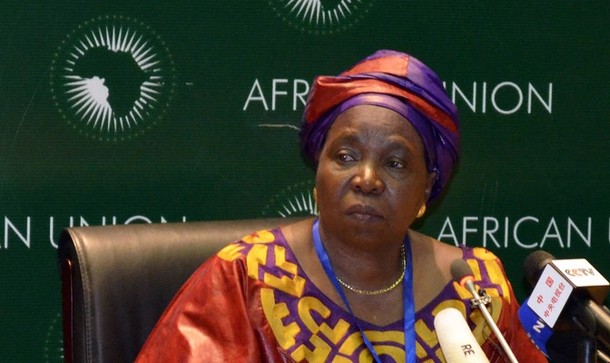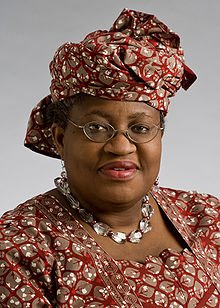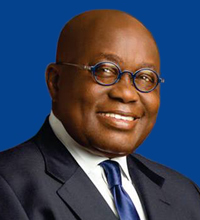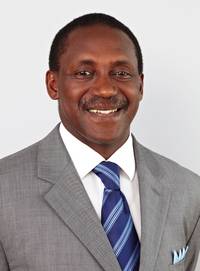 Statement by the Chairperson of the African Union Commission, HE Dr Nkosazana Dlamini Zuma to the 23rd Ordinary Session of the African Union Assembly of Heads of State and Government
Statement by the Chairperson of the African Union Commission, HE Dr Nkosazana Dlamini Zuma to the 23rd Ordinary Session of the African Union Assembly of Heads of State and Government
26 June 2014. Malabo, Equatorial Guinea
Your Excellency, Mohamed Ould Abdel Aziz, President of the Islamic Republic of Mauritania and Chairperson of the African Union;
Your Excellency, Teodoro Obiang Nguema Mbasogo, President of Equatorial Guinea and our Gracious Host;
Your Excellencies, Heads of State and Government of the Member States of the African Union;
Excellencies Former Heads of State;
Your Excellency, Ban Ki Moon, Secretary General of the United Nations;
Your Excellency, Mariano Rajoy Brey, Prime Minister of Spain,
Your Excellency, Salvador Valdes Mesa, Vice President of the Republic of Cuba
Excellencies, Members of the Executive Council and other Ministers;
Deputy Chairperson Erastus Mwencha and AU Commissioners,
Your Excellencies, Heads of AU Organs, and other International agencies;
Excellencies, Heads of African Regional Economic Communities and African Union Specialised and Representative offices;
Excellencies, members of the Permanent Representatives Committee;
Members of the Diplomatic Corps;
Distinguished invited guests;
Your Excellencies, Ladies and Gentlemen,
A warm welcome to the 23rd Ordinary Session of the African Union Assembly of Heads of State and Government, and a heartfelt thank you to our host, the President, Government and People of Equatorial Guinea for the warm hospitality and for the excellent conference facilities at our disposal.
Your Excellencies, since our last Summit, we had elections in Algeria, Egypt, Guinea Bissau, Malawi, Mauritania and South Africa. We take this opportunity to congratulate AU Chairperson President Mohamed Ould Abdel Aziz, President Bouteflika and President Jacob Zuma for their re-election, and President Arthur Peter Mutharika from Malawi for his election. We also congratulate President Abdel Fattah el-Sisi from Egypt and President José Mário Vaz from Guinea Bissau for their election and warmly welcome their two countries back to their home in the African Union.
Excellencies,
We are near the end of the development of our vision and aspirations for the next fifty years, Agenda 2063. The Africa we Want. We have a short popular version that captures the aspirations that our people voiced during the consultations and the longer technical document.
We will table these for discussions at the Summit, but beg your indulgence to allow us to popularize it and solicit further inputs, so that we present the Agenda 2063 for adoption at the next Summit, including the first ten-year plan.
We are already in year one of our fifty-year journey and are shifting gear towards working on the practical programmes in all our Agenda 2063 priority areas, the implementation issues that must take our continental agenda to a higher level, and make the change we want irreversible.
Excellencies,
When the Union over a decade ago adopted the Comprehensive Africa Agriculture Development Programme (CAADP), it was with a view to eradicate hunger and rural poverty, to grow dynamic agricultural markets within and between African countries and regions, to become a strategic player in agricultural science and technology and become once again a net exporter of agriculture and food products.
To achieve this, we set ourselves the target of increasing investment in agriculture and to increase productivity. By 2003, many countries managed to increase and grow investments in agriculture and those countries have seen improvements not only in productivity, but also in tackling hunger and malnutrition.
As we therefore debate our theme for 2014, Agriculture and Food Security, we do so with a range of policies, programmes and initiatives in already place, at national, regional and continental levels towards meeting CAADP targets.
But we need to do more and to do it faster.
This includes increased public and private investments and implementation of irrigation projects so that our farmers are not always at the mercy of whether it rain or not.
It means targets to give women who toil the fields, access to land, capital and other agricultural inputs, so that they can move from being farmworkers towards producers and owners of agrobusinesses.
It means mobilizing investments (public and private) into facilities that will stimulate agricultural markets, including energy, storage facilities, transport and lifting of restrictions on the movement of people and goods on the continent.
I have been told and have seen it myself in many of our countries that young people are not interested in agriculture and in careers in agriculture. This cannot be in a young continent such as our own.
It is however a reflection that our agriculture is in the main still traditional. A practical priority is therefor to modernize and mechanise, to use science and technology, and once and for all banish the hand hoe to museums, instead of it being the symbol of women farmers in Africa. In our recent consultations with Gender Ministers and women’s organisations, this message was strongly articulated.
We must make modern agriculture and agro-processing attractive to the younger generations, because our Green revolution needs their innovation and energy. Africa today does not train enough bio-scientists, agronomists, engineers and mechanics who can design and maintain agricultural technology, and the other critical skills required for the modernization of agriculture. We must address this as part of our skills revolution.
Amongst the country contributions we received on Agenda 2063 was from Nigeria, who proposed a target to encourage banks to lend at least 30% of agricultural lending to women. We think this is a progressive goal, we must support this and engage with our financial institutions across the continent to achieve it.
Excellencies,
Modernisation and the use of science and technology will not only help to address productivity, but also build resilience against climate change.
The threat of desertification, the drying up of our lakes such as the Great Lake Chad and other extreme weather conditions, particularly affecting our island states cannot be left to chance.
We have already put in place the mechanism of the African Risk Capacity, to provide a collective risk buffer to our agricultural sector, but we need to do more in all these areas of threats.
Agriculture is critical in our industrialization efforts as well. Agro-processing of our agricultural products are not only critical to food security, but also to increased earnings, job creation and our broader goal of industrialization.
Finally, for agriculture and our environment to flourish, we need conditions of peace and stability, and for our people not to be under threat from armed gangs, terrorists and human and arms traffickers and from poachers.
We must therefore urge all parties and stakeholders to ensure that the seizefire hold in South Sudan, that we stop the violence in Central African Republic and that we stop sexual violence in conflicts. We must create conditions for our people to return home without fear, to plow their fields and to rebuild their lives.
The continued threats faced by countries of the Sahel/Sahara of terrorism and Nigeria, in east Africa and the Horn of Africa are a threat to us all, because it creates a climate of fear and destabilization, and visits untold misery on our people.
As you pledged in the 50th Anniversary Solemn Declaration, Your Excellencies, silencing the guns in every corner of Africa must therefore remain a priority.
Excellencies, Ladies and Gentlemen
The experts on the panel debate this afternoon will no doubt provide us with ideas on how to take these issues forward.
I wish this 23rd Ordinary Summit of the Assembly of Heads and State of Government, dedicated to the theme Agriculture and Food Security fruitful deliberations.



